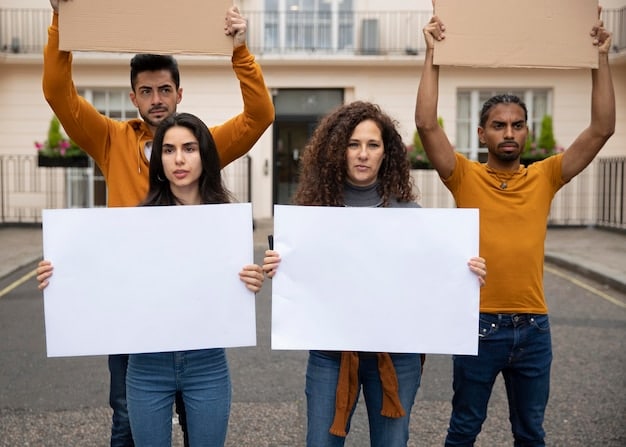Protecting Your Rights: A Legal Guide for Peruvian-Americans in the US

Protecting Your Rights: A Legal Guide for Peruvian-Americans Facing Discrimination in the US provides essential information on recognizing, reporting, and combating discrimination, offering resources and support for navigating legal challenges.
As a Peruvian-American living in the US, understanding your rights is crucial, especially when facing discrimination. This comprehensive guide, Protecting Your Rights: A Legal Guide for Peruvian-Americans Facing Discrimination in the US, provides essential information and resources to help you navigate legal challenges and ensure fair treatment.
Understanding Discrimination Against Peruvian-Americans
Discrimination against Peruvian-Americans can manifest in various forms, stemming from prejudice related to ethnicity, national origin, or language. Recognizing these discriminatory practices is the first step in protecting your rights and seeking legal recourse.
It’s important to understand how discrimination can affect various aspects of life.
Common Forms of Discrimination
Discrimination can be both overt and subtle, making it essential to be aware of the various ways it can manifest.
- Employment Discrimination: Unfair treatment in hiring, promotion, or termination based on national origin.
- Housing Discrimination: Refusal to rent or sell housing, or unequal treatment in housing terms, due to ethnicity.
- Educational Discrimination: Unequal access to educational opportunities or resources based on national origin.
- Public Accommodation Discrimination: Denial of services or unequal treatment in restaurants, stores, or other public places.

Peruvian-Americans are protected by several federal laws that prohibit discrimination based on national origin.
Understanding your legal protections is essential.
Federal Laws Protecting Against Discrimination
These laws provide a framework for addressing discrimination and ensuring equal opportunities.
- Title VII of the Civil Rights Act of 1964: Prohibits employment discrimination based on race, color, religion, sex, and national origin.
- Fair Housing Act: Prohibits discrimination in housing based on race, color, religion, sex, familial status, and national origin.
- Equal Credit Opportunity Act: Prohibits credit discrimination based on race, color, religion, national origin, sex, marital status, or age.
By understanding the types and legal protections against discrimination, Peruvian-Americans can better advocate for their rights and seek justice when necessary. Recognizing and reporting discrimination is crucial for fostering a more equitable society.
Documenting Incidents of Discrimination
Properly documenting incidents of discrimination is crucial for building a strong case and seeking legal remedies. Detailed records serve as evidence and can significantly impact the outcome of a complaint or lawsuit.
Creating a comprehensive record of discriminatory incidents is crucial.
Key Steps in Documenting Discrimination
Here are the essential steps to take when documenting instances of discrimination.
- Record Details: Immediately after the incident, write down everything you remember. Include the date, time, location, names of individuals involved, and a detailed description of what happened.
- Gather Evidence: Collect any supporting documents, such as emails, letters, memos, photographs, or videos. These can serve as tangible proof of the discrimination.
- Identify Witnesses: If there were witnesses to the incident, get their names and contact information. Their testimonies can strengthen your case.
Tools for Effective Documentation
Utilizing specific tools can help streamline the documentation process.
- Diary or Notebook: Keep a dedicated journal or notebook to record each incident. Ensure entries are dated and detailed.
- Digital Records: Save electronic communications (emails, texts) and create digital copies of physical documents.
- Audio/Video Recordings: If legal in your state, consider recording conversations or incidents, but always be aware of local laws regarding consent.

Accuracy and thoroughness are vital when documenting discrimination. The more detailed and well-organized your records, the stronger your case will be.
Knowing where to report discrimination is a vital step.
Reporting the Discrimination
Reporting incidents of discrimination to the appropriate authorities is crucial for addressing the issue and seeking justice.
- Internal Reporting: If the discrimination occurred in the workplace or an institution, report it to the HR department or relevant authority within the organization.
- External Reporting: File a complaint with federal and state agencies that handle discrimination claims.
- Legal Consultation: Consult with an attorney specializing in discrimination cases to understand your rights and legal options.
Documenting incidents of discrimination is essential for protecting your rights and seeking justice. By maintaining thorough and accurate records, gathering supporting evidence, and reporting incidents to the appropriate authorities, Peruvian-Americans can effectively combat discrimination and promote equality.
Filing a Discrimination Complaint: A Step-by-Step Guide
Navigating the legal process of filing a discrimination complaint can be daunting, but understanding the steps involved can make it less intimidating. This guide provides a step-by-step overview of how to file a discrimination complaint and seek legal remedies.
Starting the formal complaint process is a key step.
Before Filing a Complaint:
- Review Documentation: Ensure all documentation is accurate and complete. Organize your records, including dates, times, descriptions of incidents, and any supporting evidence.
- Consult with an Attorney: Seek legal advice from an attorney specializing in discrimination cases. An attorney can assess your case, explain your rights, and guide you through the filing process.
Step-by-Step Filing Process
Here’s how to proceed with filing a formal complaint.
- Identify the Appropriate Agency: Determine which agency has jurisdiction over your complaint. Federal agencies include the Equal Employment Opportunity Commission (EEOC) for employment discrimination and the Department of Housing and Urban Development (HUD) for housing discrimination.
- Complete the Complaint Form: Obtain the complaint form from the relevant agency and fill it out accurately and thoroughly. Provide detailed information about the discrimination you experienced, including dates, names, and specific incidents.
- Attach Supporting Documents: Include copies of all relevant documents, such as emails, letters, memos, and any other evidence supporting your claim.
Navigating the process often involves specific deadlines.
Understanding Deadlines and Timeframes
Deadlines for filing discrimination complaints vary by agency and type of discrimination. Missing the deadline can result in the dismissal of your case. Federal law requires you to file a charge of discrimination with the EEOC within 180 days. However, this deadline can be extended to 300 days depending on the existing state or local laws.
- Consult Legal Counsel: Always consult with an attorney to understand the specific deadlines applicable to your case.
- File Promptly: To ensure your rights are protected, file your complaint as soon as possible after the discriminatory incident.
Filing a discrimination complaint is a significant step toward seeking justice and protecting your rights. By understanding the process, gathering necessary documentation, and seeking legal guidance, Peruvian-Americans can effectively navigate the legal system and address discrimination.
Seeking Legal Assistance and Representation
Navigating the complexities of discrimination cases often requires the guidance and expertise of legal professionals. Seeking legal assistance and representation is essential for understanding your rights, building a strong case, and achieving a favorable outcome.
The process starts by finding the right legal professional.
Finding the Right Attorney:
- Specialization: Look for an attorney who specializes in discrimination law. Their expertise will be invaluable in navigating the legal process.
- Experience: Choose an attorney with a proven track record in handling similar cases. Experienced attorneys are familiar with the laws, procedures, and strategies that can lead to success.
Organizations and resources can help.
Organizations Providing Legal Assistance
Several organizations offer free or low-cost legal services to individuals facing discrimination. These resources can provide crucial support and representation.
- American Civil Liberties Union (ACLU): The ACLU is a non-profit organization that defends individual rights and liberties through litigation, advocacy, and education.
- Legal Aid Societies: Legal aid societies provide free legal services to low-income individuals and families.
- National Association for the Advancement of Colored People (NAACP): The NAACP works to ensure the political, educational, social, and economic equality of rights of all persons and to eliminate race-based discrimination.
Understanding legal fees and arrangements is essential before moving forward.
Understanding Legal Fees and Arrangements
Legal fees can vary depending on the attorney’s experience, the complexity of the case, and the fee structure. Understand the different arrangements before hiring an attorney.
- Hourly Rate: Attorneys charge an hourly rate for their services.
- Contingency Fee: The legal fees are paid from any damages that you are awarded. If you do not recover damages, you do not pay a fee.
- Flat Fee: Attorneys charge a fixed fee for handling the case.
Seeking legal assistance is a vital step in addressing discrimination cases. By finding the right attorney, exploring available resources, and understanding legal fee arrangements, Peruvian-Americans can effectively protect their rights and pursue justice.
Building Community Support and Advocacy
Community support and advocacy play a crucial role in combating discrimination and promoting equality. Building strong networks, empowering individuals, and raising awareness are essential for creating a more inclusive society.
Building a strong community network starts with joining local organizations.
Joining Community Organizations:
- Peruvian-American Organizations: These organizations provide a platform for cultural exchange, community support, and advocacy for the rights of Peruvian-Americans.
- Civil Rights Groups: Joining civil rights groups allows you to work alongside individuals from diverse backgrounds to fight discrimination and promote equal rights.
Sharing your stories can empower others.
Empowering Individuals Through Storytelling
Sharing personal experiences with discrimination can be a powerful way to raise awareness, inspire change, and provide support to others facing similar challenges.
- Share Your Story: Share your story at community events, in online forums, or through social media.
- Support Others: Listen to and support others who share their stories.
Raising awareness is a proactive measure that can lead to policy changes.
Raising Awareness Through Education
Educating others about discrimination and its impact is essential for fostering understanding and promoting change.
- Workshops: Organize workshops and seminars to educate people about discrimination and their rights.
- Social Media Campaigns: Use social media to share information, raise awareness, and advocate for policy changes.
Building community support and advocacy is vital for combating discrimination and promoting equality. By joining organizations, empowering individuals through storytelling, and raising awareness through education, Peruvian-Americans can create a more inclusive and equitable society.
Preventive Measures: Knowing Your Rights
Taking preventive measures and knowing your rights can significantly reduce the likelihood of experiencing discrimination and ensure that you are prepared to respond effectively if it occurs. Educating yourself and others about your rights is crucial for fostering a fair and equitable society.
Staying informed is paramount.
Knowing Your Legal Rights:
- Federal Laws: Familiarize yourself with federal laws that protect against discrimination, such as Title VII of the Civil Rights Act and the Fair Housing Act.
- State and Local Laws: Understand your rights under state and local laws, which may provide additional protections.
Educating others is an extension of knowing your own rights. By educating family and supporting each other, awareness and protection can be enhanced.
Educating Family and Community Members
Educating your family and community members about their rights is essential for creating a network of support and awareness.
- Share Information: Share information about discrimination laws and reporting procedures with your family and friends.
- Offer Support: Provide support to those who have experienced discrimination and encourage them to seek legal assistance.
Prevention often involves proactive measures.
Proactive Steps to Avoid Discrimination
While you cannot always prevent discrimination from happening, you can take proactive steps to reduce the likelihood of experiencing it.
- Professionalism: Maintain a professional demeanor in the workplace and other public settings.
- Documentation: Keep records of your interactions and communications, especially in situations where discrimination may occur.
Taking preventive measures and knowing your rights is essential for protecting yourself and others from discrimination. By educating yourself, educating your community, and taking proactive steps, Peruvian-Americans can promote a more inclusive and equitable society.
| Key Topics | Brief Description |
|---|---|
| ⚖️ Understanding Discrimination | Recognize various forms of discrimination against Peruvian-Americans in the US. |
| 📝 Documenting Discrimination | Maintain detailed records of incidents, gather evidence, and identify witnesses. |
| 🏛️ Filing a Complaint | Follow a step-by-step guide to file a discrimination complaint with the appropriate agency. |
| 🤝 Seeking Community Support | Build networks and promote raising awareness to ensure a more inclusive society. |
Frequently Asked Questions
▼
Discrimination includes unfair treatment in employment, housing, education, or public accommodations based on national origin, ethnicity, or language. It’s any action that denies equal opportunities.
▼
Record all details, including the date, time, location, names of involved parties, and a clear description. Gather supporting evidence like emails, letters, or photos, and identify any witnesses.
▼
Report internally to HR if it occurs in the workplace. File complaints with federal agencies like the EEOC or HUD. Also, consult with an attorney for legal advice and options.
▼
Title VII of the Civil Rights Act of 1964 protects against employment discrimination. The Fair Housing Act prohibits housing discrimination. The Equal Credit Opportunity Act prevents credit discrimination.
▼
Community networks empower individuals, raise awareness, and promote inclusiveness. Sharing stories and educating others create understanding and drive change, fostering a more equitable society.
Conclusion
Understanding your rights as a Peruvian-American in the US is paramount for combating discrimination and ensuring fair treatment. By knowing the laws that protect you, documenting incidents, seeking legal assistance, and building community support, you can effectively advocate for your rights and contribute to a more equitable society.





